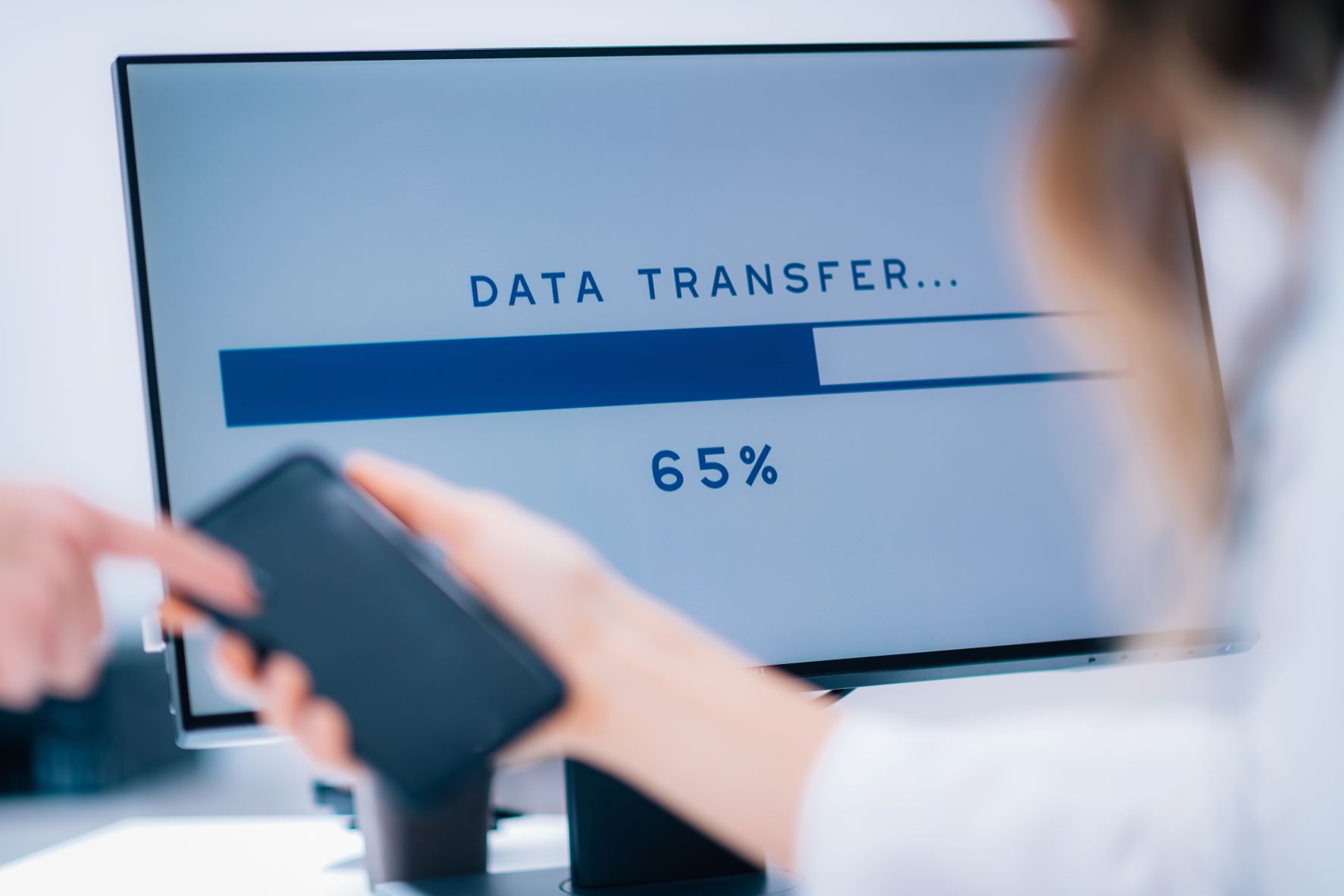Is My Data Being Sold to Marketing Companies?

If you’ve ever wondered, “is my data being sold,” our guide to internet privacy can help you take control over personal data on the web.
The data you provide to online businesses can‒and is often‒sold to various enterprises without your knowledge. This information ultimately ends up with marketing companies and data brokers, which use your personal data in different ways.
Data brokers, in particular, gather a wide range of information from unwitting consumers and even Google users, such as names and addresses, income, and online activities. They then typically sell personal information to other entities, with little to no regulation governing their usage.
Why Do Data Brokers Want My Personal Data?
Data brokers have actually existed since the dawn of the internet. They collect even the most seemingly mundane customer data, such as your magazine or newspaper subscriptions, your preferences for pets, your choice of cars, and even your financial history.
But the immense popularity of the internet has raised the stakes considerably. Think about how readily you share information on your social media pages or online retail sites. At least some of that information can easily fall into the hands of a data broker that collects data and be shared or sold online.
Julie Brill has some idea of the extent of customer data that passes through data brokers and analysis firms. According to the former Federal Trade Commission commissioner, these tech giants routinely sell access to almost every bit of information that comes their way. This includes all the pages and websites people visit, where they shop, who they connect with on social media, and more.
Even more alarming is what data brokers do with that information. The customer data is assembled into what is known as a “data brokers’ package” and is sold to other brokers or business entities. The information is then used to develop targeted ads for specific types of consumers.
All this effort pays off in a big way. One of the biggest data brokers in the world, Acxiom, regularly pulls in hundreds of millions of dollars in revenue every year. And that is just one of the hundreds of data-brokering firms and tech giants that collect and sell data.
Acxiom offers what it calls “analytical services” to millions of households and individuals. The industry generates hundreds of billions of dollars annually, employing millions of workers in the U.S. alone.
How is Data Collected From You?
There are many ways by which businesses collect data, often from many different sources. Some of these methods rely on complex processes and sophisticated technologies. Others companies collect data via more deductive processes, although these can involve sophisticated tools as well.
According to Workday data science manager Liam Hanham, data collection involves a well-planned business strategy that consists of the following methods:
- Asking customers to provide data directly
- Tracking customers
- Appending customer information to existing data
Most companies use a combination of these and other methods to collect and process data from customers. The information collected can range from demographics to consumer behavior.
Many large and established businesses have developed highly efficient systems for gathering data from tens of thousands of sources, including public and government records. But some of the most commonly utilized sources are the customers themselves.
For example, plenty of valuable information can be obtained from how consumers interact on company websites or social media channels. Phone calls, live chats, and other customer service routes are also abundant sources of other data for marketers.
It may surprise you to know how often companies rely on the most direct method for gathering data online, which is asking for it directly from you. But this isn’t necessarily as straightforward as you might think.
For example, downloading a whitepaper or receiving a free gift often requires you to provide your email address, fill out a form, or complete a survey. You might even provide some information when answering service calls.
Corporations are also known to use data trackers to get information from you without your knowledge. All websites utilize this method to some degree. Among the information collected from all the interactions and online activities you engage in are the following:
- how long you stay on the site or a particular page
- how deep you go into a page
- how many times you scroll
- the links you click
- which browser or operating system you use
- your login email and password
Furthermore, all this information is associated with an IP address. And with access to an IP address, it is a relatively simple matter to connect it to an actual individual.
Location-based advertising is a common example of the use of data-tracking technology. Through your IP address and other devices connected with your primary device, corporations can put together a data profile of you. The information collected can then be used to target your devices with personalized ads.
Companies also utilize service records to determine how often you’ve communicated with their sales and support departments. From these interactions, they can derive information about customer preferences, successful and unsuccessful campaigns, and so on.
Finally, corporations may simply resort to purchasing your data from a third party. With any of the services that require you to provide data, there is likely a statement in the user agreement indicating the possibility of selling access to your online data to other firms.
What Type of Data is Being Collected?
Almost any type of information that can be obtained from consumers is useful to someone else. Data brokers collect names, email addresses, phone numbers, IP addresses, and even the device IDs of laptops and mobile phones used to access the site.
Some companies may even collect such data details as the pets you have, your hobbies and offline activities, your vehicle’s fuel economy, and even your sexual orientation.
More alarmingly, some may collect your bank information, credit card details, and health records, delve into your social media accounts and search history, and use whatever you share on these platforms.
Consumer data collected by businesses generally belong to the following categories:
- Personal data: This consists of information associated with individuals, such as gender, physical characteristics, and even Social Security numbers and property records. It may also include information that can’t directly be associated with an individual, such as IP addresses, browser cookies, and laptop and mobile device IDs.
- Engagement data: This includes data on consumer interaction with websites, emails, mobile apps, phone texts, social media sites, ads, and customer service channels.
- Behavioral data: This includes details on purchase criteria, product use, transactional details, and qualitative data such as site actions and behavior.
- Attitudinal data: This includes information on consumer satisfaction, purchase decisions, and product desirability.
How is Your Data Being Used?
Data collected from consumers can be used in several ways. For instance, smartphone companies monitor usage to improve the customer experience and understand the needs of their customers better. The data could also be used to improve customer engagement and improve products and services.
Many companies use collected data to improve their marketing strategies. By understanding how consumers engage and react to their marketing campaigns, marketers can adjust their approach accordingly.
But companies also use personal data in less favorable ways. Some collect user data for revenue generation, selling these to third-party entities such as data brokers. And once they sell data to these organizations, it could change hands several times.
Other companies use the information they collect from consumers to obtain even more data, sometimes of a highly sensitive nature. As data collection and analytics technologies improve and companies employ sophisticated software, there will likely be newer and more efficient ways to gather and utilize consumer data from a wider range of sources.
What are Some Laws That Protect Consumer Privacy?
Admittedly, there is much that remains to be done with regard to protecting consumer data. That being said, there are some data privacy laws in place for this very purpose. If you’ve ever asked yourself the question, “is my data being sold online?” these regulations are designed to give you the right to stop marketers from selling or sharing your data.
Among these data privacy regulations are:
California Consumer Privacy Act
The California Consumer Privacy Act, or CCPA, is perhaps the most significant data privacy initiative in the United States. It has many similarities to GDPR regulation, but instead of limiting the data collected by service providers, it provides consumers the opportunity to opt out of the data collection process.
The California law also assigns the task of developing data laws to the state instead of leaving it to corporations.
Virginia Consumer Data Protection Act
The Virginia Consumer Data Protection Act, or VCDPA, took effect on January 1, 2023. Like the CCPA, it assigns consumers the responsibility to opt out of data processing or sales.
The law also requires corporations to retain only the information that is relevant to their business objectives and remove all the data when that objective is achieved.
Companies subject to the VCDPA should also inform consumers of their legal rights to data privacy and how to ensure their protection.
Colorado Privacy Act
The Colorado Privacy Act, or CPA, is scheduled to go into effect on July 1, 2023. Like the previously mentioned laws, this requires consumers to opt out of data collection.
The CPA is focused on targeted advertising and some data-based profiling methods. The law requires data-holding organizations to address consumer requests to remove their personal data within 45 days and post privacy notices on their sites.
How can you Protect Your Data?
Protecting your data can be challenging, given the ambiguity of the fine print that companies include to supposedly allow you to protect your privacy. But there are some things you can do to minimize the chances of your data being shared or sold to third parties. Some steps you may want to consider are:
- Blocking ads and trackers: Browsing different websites online presents many opportunities for your data to be collected. Ads and trackers are among the most common culprits, obtaining useful information that businesses can access. You can avoid this by installing browser extensions that protect your data by blocking ads and trackers.
- Using a VPN service: A VPN routes information from your device to a third-party server. This helps conceal your browsing activity, effectively placing a barrier between your data and entities that otherwise have access to it. Some VPNs provide data encryption features as well, giving you an added measure of protection.
- Avoiding free apps and platforms: Free apps and platforms are tempting, but they almost always require you to give up your data privacy to some degree. Remember this: for every service provided for free, it is you or your information that is actually the commodity that changes hands. This is the case with social media platforms, all of which offer free services in exchange for your data, which they then sell for profit. Always treat free services and apps as suspects, especially those that don’t offer a paid option.
- Provide fake information for non-essential memberships: Most essential services require you to provide accurate and up-to-date personal information. This is the case with insurance and healthcare companies, with which providing fake information is detrimental and even illegal. But that doesn’t necessarily apply to all services. For non-essential services such as a movie streaming site or online forum, there is no harm in concealing your data or providing fake information. Doing so reduces the chances of having personally identifiable information that can be tied to you from falling into the wrong hands.
- Minimize links between apps: It is often more convenient to have your various personal apps connected to each other. But it also allows your sensitive data to be shared between different apps, increasing the possibility of access by third-party entities. Try to avoid linking apps as much as possible to reduce the connections between yourself and data miners.
FAQ
1. Is data collection legal?
There is little in the way of legislation that prevents data brokers from collecting data and using it however they want. Online privacy laws are non-existent in the U.S., and most companies are all too eager to exploit legal loopholes.
One of the biggest data brokers in the world is Acxiom. According to its CEO, Scott Howe, the company only uses “secure, appropriate, and legal” means to collect personal data. Even so, this data can be used in ways that consumers may not agree with.
2. Can collecting data benefit the consumer?
Data collection can have legitimate business purposes and be beneficial to consumers. Some companies capture data and use the information they collect to improve customer service or enhance the customer experience. When used in this manner, collected data can help companies understand the needs of their customers better and provide them with better service.
Companies can also use collected data to refine their marketing strategies. With the use of this data, companies gain a better understanding of customer engagement and response to their marketing campaigns. This, in turn, provides a clearer picture of what customers want or expect from the company.
3. Can companies be relied on to protect consumer data?
Not necessarily. Companies stand to gain many benefits from gaining access to and selling data. They can use it to generate revenue and collect even more data.
Many companies do provide customers the opportunity to opt out of data of the sale or sharing of their information. But these often require the user to submit even more information.
4. What can consumers do to protect their data?
It’s an uphill battle to keep consumer information out of the hands of third parties. But there are some things you can do to minimize the risk of your data falling into the wrong hands. Among these are:
- Blocking ads and trackers
- Using VPNs
- Avoiding free apps and platforms
- Providing fake information to non-essential services
- Avoiding linking apps
These measures don’t guarantee full protection against stolen data or a data breach. But they will at least make it more difficult for corporations to collect data from you and pass it on to third-party organizations.
Contact InternetPrivacy Today
InternetPrivacy has years of experience upholding privacy policies and protecting clients from unwanted data companies selling your personal info, including your home address or phone numbers. Our data removal services feature competitive pricing and proven results. If you can’t get companies to stop selling your data and you’re concerned about your digital privacy, our team is ready to assist.
We employ proprietary techniques to scan the web and start the deep data removal process to ensure any data collected on you are eliminated from the internet. If you want to stop the sale or trade of your information, contact InternetPrivacy today at 866-349-0130 for a free online analysis.





